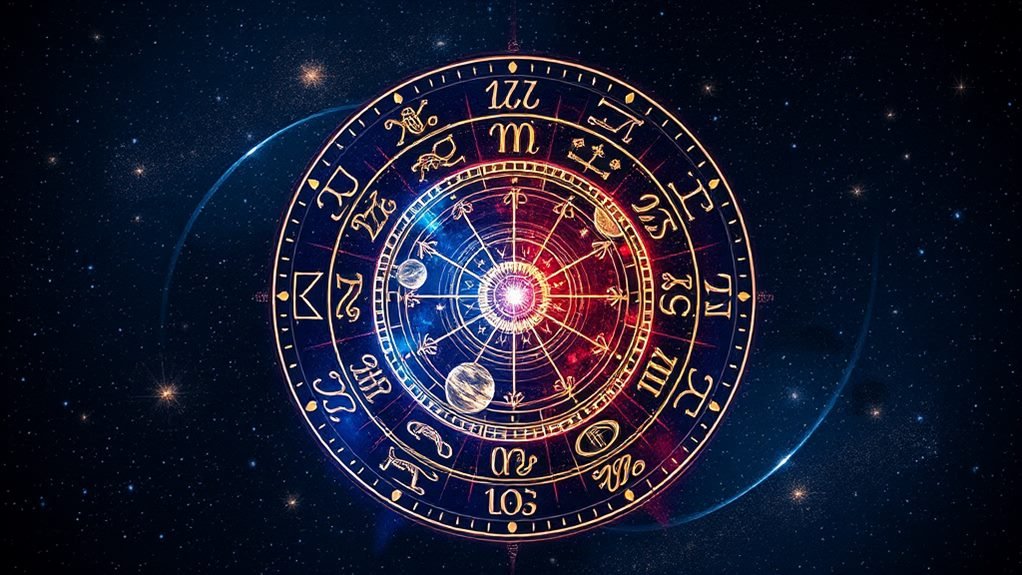Are Astrology and Astronomy the Same Thing? Let's Find Out!

Have you ever wondered whether astrology and astronomy are the same thing? While these two fields of study may sound similar, they are actually quite different in nature and approach. In this article, we'll explore the distinctions between astrology and astronomy to help you better understand each one.
Throughout history, astrology and astronomy have been closely linked, with both disciplines seeking to understand the mysteries of the universe. However, their methods, goals, and beliefs are vastly different.
What is Astrology?
Astrology is an ancient practice that has been used for thousands of years to study the movements and positions of celestial objects and their influence on human affairs. It is based on the concept that there is a connection between the patterns and movements of the stars and planets and events and experiences in our daily lives.
Astrology originated in ancient Babylon and Greece and has been developed and refined over time by many different cultures and civilizations. It has been used for a variety of purposes, including predicting future events, understanding personality traits, and offering guidance and advice.
One of the fundamental principles of astrology is that each individual is born under a particular astrological sign, which is determined by the position of the sun, moon, and planets at the time of their birth. There are twelve zodiac signs in astrology, each representing a different set of personality traits and characteristics.
""Astrology is the study of the movements and relative positions of celestial objects as a means for divining information about human affairs and terrestrial events." - Oxford English Dictionary
What is Astronomy?
Astronomy is a scientific field that studies celestial objects, including stars, planets, galaxies, and other phenomena beyond Earth's atmosphere. Unlike astrology, which is more focused on interpreting the influence of celestial bodies on human affairs, astronomy is based on empirical evidence and follows the scientific method.
Astronomers use a range of techniques and tools to observe and analyze the universe, including telescopes, satellites, and advanced computer models. The study of astronomy plays a crucial role in our understanding of the universe and its origins, as well as in the development of new technologies and scientific breakthroughs.
Astronomy is also closely related to other scientific disciplines, such as physics, chemistry, and mathematics, as it involves the application of these fields to understand the complex workings of the universe. Through the study of astronomy, we are able to gain new insights into the nature of space and time, as well as the underlying laws that govern the cosmos.

The Differences Between Astrology and Astronomy
Despite both being concerned with the study of celestial objects, astrology and astronomy are fundamentally different in their approaches, goals, and methods of study. Here are the key differences you need to know:
| Astrology | Astronomy |
|---|---|
| Studies the positions and movements of celestial objects in relation to human experience and behavior. | Focuses on the scientific study of celestial objects, such as stars, planets, and galaxies. |
| Relies on divination and horoscopes to make predictions and offer insights into human personalities and life events. | Relies on empirical observation and scientific methods to gather data and formulate theories about the physical properties and behavior of celestial objects. |
| Considered a pseudoscience by the scientific community and subject to criticism for its lack of empirical evidence and testable hypotheses. | Considered a legitimate scientific discipline that seeks to understand the universe through observation, experimentation, and mathematical modeling. |
Overall, while astrology and astronomy share a common interest in celestial objects, they have different goals and approaches to studying them. Astronomy is a scientific discipline that seeks to understand the universe through empirical observation and mathematical modeling, while astrology is a divinatory practice that seeks to offer insights into human experience and behavior through the positions and movements of celestial objects.
The Similarities Between Astrology and Astronomy
Although astrology and astronomy are distinct fields of study, they share some notable similarities. Some of these similarities include:
| Astrology | Astronomy |
|---|---|
| Origins: Both astrology and astronomy have their roots in ancient civilizations, such as the Babylonians and Greeks. | History: Both fields have contributed greatly to our understanding of the universe and its workings throughout history. |
| Celestial Objects: Both astrology and astronomy are interested in studying celestial bodies, such as planets, stars, and galaxies. | Observation: Both fields rely on observation and data collection to draw conclusions about the universe. |
| Significance: Both astrology and astronomy hold great significance in human society, influencing cultural beliefs, spirituality, and scientific advancements. | Mysteries: Both fields continue to explore the mysteries of the universe, with new discoveries and advancements being made regularly. |
While astrology and astronomy may differ greatly in their approach and methodology, it is important to recognize the shared interests and contributions of both fields to our understanding of the universe.
Are Astrology and Astronomy the Same Thing? Understanding the Distinctions
"Are astrology and astronomy the same thing?" is a question that often arises due to the similarities in their names. However, the two are fundamentally different in essence and approach. Astrology delves into the spiritual realm, interpreting celestial patterns to provide insights into one's personality and destiny. In contrast, astronomy is anchored in science, systematically studying celestial objects and the vastness of the universe. While they both concern celestial bodies, it's pivotal to distinguish the interpretative nature of astrology from the empirical focus of astronomy.
Astrology vs Astronomy: A Closer Look
While astrology and astronomy share some similarities, they are fundamentally different disciplines. Astrology is often considered a pseudoscience, as it relies on the interpretation of celestial objects to make predictions about human affairs and personalities. Astronomy, on the other hand, is a scientific discipline that focuses on the study of celestial objects and their physical properties.
One of the main differences between astrology and astronomy is their approach to knowledge. Astrology is based on subjective interpretations and beliefs, while astronomy relies on empirical evidence and the scientific method. Astrology also places significance on the timing and alignment of celestial events, while astronomy focuses on the physical properties and behavior of celestial objects.
The Fundamental Differences
Another key difference between astrology and astronomy is their goals. Astrology seeks to understand human behavior and predict future events, while astronomy aims to understand the universe and its workings. Astrology is often associated with spirituality and mysticism, while astronomy is firmly rooted in scientific inquiry.
Astrology and astronomy also differ in terms of their methods of study. Astrology relies on astrological charts and horoscopes, which are based on the position of the planets and other celestial objects at a particular time. Astronomy, on the other hand, uses telescopes and other scientific instruments to observe and collect data on celestial objects.
Similarities Between Astrology and Astronomy
Despite their differences, astrology and astronomy share some commonalities. Both disciplines have their origins in ancient civilizations that studied the stars and planets. Furthermore, both astrology and astronomy continue to have significant cultural and historical significance.
Both astrology and astronomy also share an interest in celestial objects, although their approach to studying them differs. Astrology places significance on the symbolic meanings and interpretations of celestial objects, while astronomy focuses on their physical properties and behavior.
However, it is important to note that the similarities between astrology and astronomy do not make them the same thing. While they may share some commonalities, they are fundamentally different disciplines that serve different purposes.
Astrology and Science: Can They Coexist?
-
Astrology and Science: A Historical Tension
- Astrology and science have traditionally been in conflict.
- While many scientists view astrology as mere superstition, it has persisted for millennia and is still prevalent in numerous cultures.
-
Divergent Approaches to Knowledge
- Science: Emphasizes empirical evidence and utilizes the scientific method to validate hypotheses.
- Astrology: Seeks to understand human affairs through the interpretation of celestial objects' positions and movements.
- Although astrology might intersect with scientific fields like astronomy or psychology, it doesn't conform to strict scientific standards.
-
Astrological Claims and Scientific Scrutiny
- Astrology posits that celestial bodies influence human actions and occurrences, a claim challenging to validate scientifically.
- Some astrologers might employ scientific jargon or ideas, but astrology fundamentally remains a field grounded in personal belief and interpretation.
-
The Argument for Coexistence
- Advocates for astrology suggest it offers a comprehensive universe view that enriches scientific understanding.
- Some contend that science has its own boundaries and doesn't encompass the entirety of human experience, thus allowing space for alternative viewpoints like astrology.
-
Scientific Skepticism
- A significant number of scientists label astrology as pseudoscience.
- Their criticisms center on astrology's lack of empirical backing, its dependence on subjective readings, and its presentation of untestable claims. Consequently, mainstream scientific circles don't recognize astrology as a legitimate scientific field.

The ratings are as follows:
- Origins: Both astrology and astronomy have ancient origins, with roots in early civilizations. Astrology gets a rating of 8.
- Purpose: Astrology's main purpose is to interpret celestial objects for insights into human behavior and predict future events, earning it a rating of 6.
- Methodology: Astrology relies on astrological charts and horoscopes, which are based on the position of celestial objects at a particular time. It gets a rating of 5.
- Scientific Recognition: Astrology is not recognized as a scientific discipline by the scientific community, giving it a rating of 2.
- Influence on Society: Astrology has had a significant impact on human culture, beliefs, and practices over the centuries. It gets a rating of 7.
This graph provides a visual representation of the key aspects of astrology based on the information from the article. If you'd like a similar graph for astronomy or any other visual representation, please let me know!
Debunking Common Myths about Astrology and Astronomy
Despite being distinct fields of study, astrology and astronomy are often confused with one another. This confusion can lead to popular myths and misconceptions about the nature and purpose of each discipline. Here are some of the most common myths about astrology and astronomy:
| Myth | Fact |
|---|---|
| Astrology and astronomy are the same thing. | While they share some similarities, astrology and astronomy are distinct fields of study. Astronomy is a natural science concerned with the observation and study of celestial objects, while astrology is a pseudoscience that claims to divine information about human affairs and terrestrial events based on the positions and movements of celestial objects. |
| Astrology is a science. | Astrology is not recognized as a scientific discipline by the scientific community. Its claims are not based on empirical evidence and are not subject to scientific testing or verification. |
| Astronomy has no connection to astrology. | While they have different approaches and objectives, both astrology and astronomy have historical roots in the observation and study of celestial objects. In fact, many early astronomers were also astrologers, and astrology played a significant role in shaping astronomical knowledge and discoveries. |
| Astrology can predict the future. | There is no scientific evidence to support the claim that astrology can predict future events or outcomes. Astrological predictions are often vague and open to interpretation, and any apparent accuracy is likely due to self-fulfilling prophecies or confirmation bias. |
| Astronomy is only useful for scientists. | While astronomy is a scientific discipline, it has practical applications and benefits for a wide range of people and industries. Astronomy has helped humans navigate, tell time, and understand our place in the universe. It has also led to technological advancements in fields such as telecommunications, medicine, and transportation. |
In conclusion, it is important to distinguish between astrology and astronomy and to separate fact from fiction when it comes to understanding their respective natures and purposes.
The Importance of Astrology and Astronomy
Astrology and astronomy have played significant roles throughout human history, shaping our understanding of the universe and our place within it. From ancient times to the modern era, both disciplines have influenced various aspects of human society, including the arts, sciences, religion, and popular culture.
Astrology, with its focus on the interpretation of celestial objects and their influence on human affairs, has been used for centuries as a tool for self-reflection and guidance. Many people believe that the movements of the stars and planets can provide insight into one's personality, relationships, and future prospects. Astrology has also been used as a basis for medical and agricultural practices, as well as for predicting natural disasters.
Astronomy, on the other hand, has been used primarily as a scientific discipline, aimed at understanding the fundamental principles of the universe. Through observations, mathematical calculations, and technological advancements, astronomers have contributed to our knowledge of celestial objects, galaxies, and the origins of the universe. Astronomy has also played a significant role in navigation and timekeeping, enabling humans to travel and explore the world around them.
Both astrology and astronomy have had a profound impact on human culture and society, inspiring artists, poets, philosophers, and scientists alike. They have provided us with a sense of wonder and awe, as well as a deeper understanding of our place in the cosmos. Whether we choose to view them as complementary disciplines or competing worldviews, astrology and astronomy continue to shape our world and our understanding of ourselves.
The Impact of Astrology and Astronomy on Society
Astrology and astronomy have been significant influences on human society throughout history. They have impacted various aspects of culture, spirituality, and knowledge, and continue to do so today.
Here are some ways in which astrology and astronomy have had an impact on society:
| Astrology | Astronomy |
|---|---|
|
|
Despite their differences, astrology and astronomy share a common fascination with the stars and the universe, and their impact on society cannot be denied.
Conclusion
After exploring the similarities and differences between astrology and astronomy, it is clear that they are not the same thing. While astrology is a belief system that uses celestial bodies to make predictions and offer insights into human behavior, astronomy is a scientific discipline that studies celestial objects and phenomena through observation and analysis.
Despite their differences, astrology and astronomy share a common interest in the study of the universe and have both played significant roles in shaping human knowledge and culture. While astrology may not be considered a science in the traditional sense, it continues to have a strong influence on many people's beliefs and practices.
Ultimately, whether one believes in astrology or not is a matter of personal choice. However, it is important to understand the distinctions between astrology and astronomy and acknowledge their unique contributions to our understanding of the universe.
FAQ: Are Astrology and Astronomy the Same Thing?
After exploring the differences and similarities between astrology and astronomy, you may still have some questions about whether they are the same thing. Here are some of the most frequently asked questions and their answers:
Q: Is astrology a science?
A: No, astrology is not considered a scientific discipline. While it may involve the study of celestial objects, it is based on a belief system and does not rely on empirical evidence or the scientific method.
Q: Is astronomy a science?
A: Yes, astronomy is a scientific discipline that relies on observation, experimentation, and the scientific method to study celestial objects and their behavior.
Q: Can astrology and astronomy be practiced together?
A: It is possible for individuals to have an interest in both astrology and astronomy, but they are fundamentally different fields of study. Astrology is based on a belief system that focuses on the influence of celestial objects on human behavior, while astronomy is a scientific discipline that seeks to understand the universe through observation and experimentation.
Q: Do astrologers and astronomers have similar job duties?
A: No, the job duties of an astrologer and astronomer are quite different. Astrologers are focused on creating horoscopes and interpreting the positions of celestial objects in relation to human behavior, while astronomers are focused on conducting research, analyzing data, and publishing scientific findings in academic journals.
Q: Can astrology and astronomy coexist?
A: Yes, astrology and astronomy can coexist in the sense that they both involve the study of celestial objects. However, they are fundamentally different in their approaches, goals, and methods of study.
Q: Is there any scientific evidence to support astrology?
A: No, there is no scientific evidence to support the claims made by astrologers. While there may be anecdotal evidence or personal experiences that some individuals find compelling, astrology is not recognized as a legitimate scientific discipline by the scientific community.
Q: Why do some people believe in astrology?
A: People may believe in astrology for a variety of reasons, such as cultural traditions, personal experiences, or a desire for guidance or meaning in their lives. However, it is important to recognize that astrology is not based on empirical evidence or scientific principles.
We hope this FAQ has provided you with some clarity on the differences between astrology and astronomy and whether they are the same thing. Remember, while they may both involve the study of celestial objects, they are fundamentally different in nature.
🔴 Need Clarity on your Situation?




